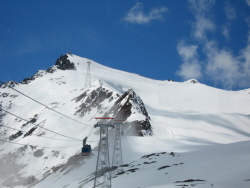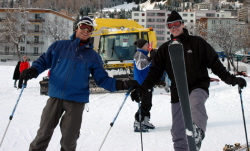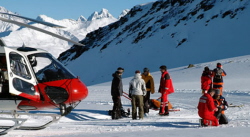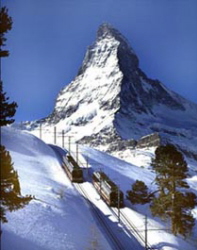Warm Up for the Ski Season…………….
It was a cold crisp morning in Zürich on Friday 2 November. The frost glittered in the morning sunlight - it looked as if icing sugar had been lightly sieved over the rooftops and cars. It appeared that this signalled the end of the rather mild autumn weather (for the northern part of Switzerland) and our thoughts start to turn to the winter season, conjuring up images of snow-laden trees, icicles and sledging.
In the month in which the Räbechilbi (Turnip Fair) takes place – it is held on the second Saturday in November in the village of Richterswil on Lake Zürich, some may be thinking about booking a ski holiday again or even taking their first steps on the slopes.

Switzerland is famous for skiing, which is stereotypically labelled an elitist sport. Photographs of The British Royal Family (as one example) on the slopes at Klosters reinforce this image. HRH The Prince of Wales, in 2005, had his “sort of” Stag party in the ski resort of Klosters however it did not bring out the best in him. Did the lack of ideal skiing weather make Charles grumpy or was it down to the hordes of paparazzi following him and his two sons? I say “sort of” Stag party due to the fact that Kate Middleton (HRH Prince William's girlfriend) was in Klosters also. Maybe this was a modern, mixed, pre-wedding party.
My first trip to a ski resort was in March 2001 and it was to Davos. It was a wonderful experience but not being adequately prepared led to a few problems e.g. I must have thought that I was travelling to Antartica based on my choice of clothes. Having never travelled up a mountain before I did find the purchase of the relevant lift pass to be a little daunting but my ex-work colleagues assisted. I had not anticipated that the cable cars would be as crowded as the London Underground – obviously not aware how popular skiing is. The method of coping with my fear of heights was to attentively listen to my companions and not say too much. The scenery that awaited was stunning and we were fortunate that it was a clear blue sky. My colleagues went off skiing superbly leaving me to tentatively make my way to the restaurant and bar.
Tip: If you are a bit unsteady on your feet in snow and ice, a ski pole is a wonderful asset as it helps you keep your balance.
I chose not to have any skiing lessons during that trip, as I wanted to try to get to grips, sometimes literally, with the landscape and ski culture.
So what can anyone do to prepare for a fun skiing holiday / experience?
David Sincock, an Alpine Ski Instructor, of White Heat Skiing Limited kindly agreed to talk to me on Wednesday 25 October and provided the following helpful information: -
As Maria said, “ Let’s start at the very beginning……..”
(FYI: to dispel a common myth: The Sound of Music was set in Austria not Switzerland)
White Heat does organise HothouseBeginners courses, the absolute beginners’ courses taking place on 2&3 December and 9&10 December. These courses in the past have proven to be good fun.
More details can be seen on the website: www.whiteheatski.biz
or you can telephone David Sincock : +41 (0) 81 416 2775
NB: Please may we ask if anyone does decide to contact White Heat as a result of this article please can they mention XpatXchange – Thank You.
Before arriving at the ski resort is there any special preparation one can do?
Level of Fitness / Exercise
There is not a specific fitness test one can carry out before starting to ski but any type of exercise activity will help. Cycling will most likely prove beneficial and it also helps with that much-needed requirement: BALANCE.
If you have about as much balance as The Millennium Bridge* in London (just joking) please do not despair because David Sincock advised that balance can be improved. One simple exercise is to stand on one leg then when comfortable with this technique try it with your eyes closed. Pilates provides a good foundation as it concentrates on the core strength and balance. People who are experiencing weakness in their knee joints (as one example) should consult with their doctor as to their suitability for this activity. One of my ex-work colleagues had an operation of her knee but with the correct physiotherapy and the prescription of a supportive knee brace she was able to go skiing again once her doctor gave her the all clear. Anyone that may have a health condition affected by altitude sickness, please bear this in mind, and again consult with your doctor to ensure there will be no problems. The nursery slopes are not situated high up in the mountains but you may wish to travel to higher altitudes with your friends, colleagues, or relatives and may find the thinner air difficult to acclimatise to.
Please be aware that skiing does not suit everyone e.g. an inactive overweight person may find it, quite literally, a mountain too high to conquer. But please do not be deterred from visiting ski resorts such as Davos because they do offer a wide variety of activities and breathtaking scenery. Whilst your relatives and friends may be on the slopes you can catch up with some alternative activities e.g. visiting museums or a wellness centre.
*If anyone is interested in reading about The Millennium Bridge, more details can be seen on: -
http://news.bbc.co.uk/1/hi/england/1829053.stm
Age
There is no ideal age to learn how to ski. Generally younger people learn more quickly. The few times that I have visited ski slopes it was good to see people of a wide range of ages enjoying themselves, providing an opportunity for families to have fun together on the slopes. Snowboarders are typically younger but there are no hard and fast rules restricting access to healthy, active older people.
Nervous Novices
If you tend to have a nervous disposition it is recommended to arrange individual lessons from an empathetic professional instructor. It is important not to feel under pressure to view it as a competitive chore but an enjoyable activity. Take it easy at the beginning and hopefully this will prevent you from scaring yourself from returning to the slopes. David Sincock mentioned that it might not be a good idea to ask your partner or spouse to teach you how to ski as it presents similar challenges as asking them to teach you to drive.J
Language
Most ski instructors in Switzerland speak English at a high standard but please take this into account when visiting other countries. Sadly, the British are not well known for their multi-lingual skills - lazy English, was one description used by an ex-Swiss work colleague. It may help to understand some basic local (official language) phrases of the ski resort you plan to visit. It may be an unrealistic request to ask visitors to master Swiss German (as one example) as the dialect differs depending in which area you are visiting.
Children
Children tend to learn best in a group, as it is more fun for them.
Learning in a Group as an Adult
David Sincock informed me that the disparity of people potentially could prove a challenge for an instructor. Some people need more assistance than others whilst in the mean time the members of the group who are taking to the skis like a duck to water may start to get frustrated and bored. The maximum in a group is ideally 8. If groups are made up of 12 or more this is not practicable. There is a progression to the learning process i.e. it is beneficial to return to the slopes reasonably often – the improvement is notable. If a novice has a one off weekend and does not return until the following year it may result in reverting back to beginners lessons.
What Not to Wear
Definitely not Jeans. Once the material gets wet from the snow it will remain wet and will be very uncomfortable for the person wearing them.
Suitable waterproof jacket, trousers, and gloves are recommended. Please learn from my experience - it can get very warm at the top of a mountain, especially when dressed in cumbersome thick items of clothing. The key is to wear lots of thin layers. This allows for the flexibility to remove some layers as long as you remember to bring a small light rucksack with you J Items such as: bottle of water, hankies, sunglasses, camera etc.. can also be placed in the rucksack.

The thinner type clothes applies to socks as well. Thick woolly socks can be liability especially if your feet tend to swell up when hot.
Good quality eye protection is important to prevent the eyes swelling. If you wear prescription glasses it may be wise to seek advice from an optician. Some people wear goggles over glasses or it might be an option to purchase prescription sunglasses.
When packing for a ski trip Sun Cream / Sun Tan Lotion may not be the first product that would jump into one’s mind as this is typically associated with a beach holiday. The brilliant white of the snow reflects the strong sunlight and can cause your exposed skin to burn. Has anyone seen people return from a ski holiday doing a very good impersonation of a lobster who had been wearing goggles? J It is not flattering and it looks uncomfortable and sore. Also, do not forget the protection cream for your lips.
Skis, boots, ski poles can be hired until you decide whether this will be a regular pastime.
Many years ago when I only knew of one person, who went skiing i.e one of my ex-work colleagues in London, it troubled me as to what the female skiers wore on their feet in the evenings. This is an embarrassing admission but will tell the tale as I think it highlights one of the misconceptions people may have or was it only me J
My perception was the ski resort would be covered in snow and ice so I wondered how the women coped walking around town in their evening sandals. The Après Ski culture is very relaxed and there are not many women tottering around in their Jimmy Choos J From what I witnessed, many people wore leather type boots (not ski boots) with trousers in the evenings. I am sure there are many designer label boots. My ignorance was born out of never having travelled to a ski resort and the association with the culture of sun, sea, and sand package tours where bare feet and dainty evening sandals were more appropriate.
Dietary requirements
Remember to take regular drinks of water – it is essential not to become dehydrated. Alcohol is not a substitute for water and it is advisable to keep the Après Ski until the evenings. It is also important to take time to have lunch and relax for an adequate time. Some people may have a career where they are not used to being so physically active and your body needs assistance readjusting to your new daily routine.
Insurance
Visitors to Switzerland should be made aware that medical costs are high in this country. If you have friends or relatives coming to join you for a ski weekend, ensure they have adequate travel insurance i.e. read the small print to ensure it covers all the necessary costs.
Skiing is not risk free as with most activities in life. It is interesting to hear different people’s view e.g. if someone gets injured during a skiing trip, the typical response is “well, they were foolish enough to get involved with such a dangerous sport etc..” but if someone is injured in a car accident, normally sympathy is offered without any understanding that even normal daily routine involves risk.
Avalanches are one of the most dangerous threats to skiers. Inexperienced groups who mistakenly think there are no consequences to skiing off piste learn a very harsh lesson. Avalanches are not only a natural phenomenon but can be caused as a result of reckless behaviour by humans. The maps showing the different levels of runs e.g. green, blue, red and black... are there for a good reason – your safety. Do be aware that piste classifications vary in different resorts and countries. For more detailed advice please select the following page from the Ski Club of Great Britain website: -
http://www.skiclub.co.uk/skiclub/guides/page.asp?intGuideID=13
The following photograph depicts a dramatic rescue of a group who made an ill informed decision to ski off piste. Rescuers with sniffer dogs saved two buried victims. This photograph and the two previously are being used with the kind permission of White Heat Skiing Ltd.

In March 1988 Major Hugh Lindsay tragically died when an avalanche hit the experienced royal ski party, in Switzerland, who were skiing off piste accompanied by a professional guide. The party included HRH The Prince of Wales who did not suffer any physical injury but was allegedly very shaken mentally by the accident. Some reports have speculated that the party were strongly advised not to ski off piste that day but sadly a decision was made to continue.
Best time of year to ski
The ski season typically starts from the end of November until the end of April. As with other matters please check the details with the local tourist office.
If you are dreaming of a white Christmas in a pretty alpine village, it is highly recommended to book early. It may prove tricky to reserve hotels for short stays i.e. one or two nights, during the Christmas period. As with many holiday destinations the prices are inflated during such periods as Christmas, Easter etc..
January can prove to be a little bleak, in the terms of weather conditions and please remember that the global media, protestors and high level security descends on Davos to cover the World Economic Forum Annual Meeting during this month. The planned dates for 2007 are 24 – 28 January.
February is a popular month but many people prefer March and April due to the fact that, typically, there is more sunshine and the days are longer.
David Sincock mentioned that he is glad he made the decision to make the change in career to be a ski-instructor. It is satisfying to help people learn and see the progress being made. David turned his holiday pastime into his work, which I applaud as far too many will remain stagnant in unchallenging careers because the fear of leaving is too overwhelming. It is important for novice skiers to accept what their limits are and seek professional tuition.
Skiing is a fairly common pastime in Switzerland and some view it as an enviable lifestyle to be able to take a short train journey to a ski resort. I have worked with a few Swiss nationals who did not go skiing so not every Swiss citizen is a ski champion J The mass market in ski tourism has made it a more accessible activity and it is not as expensive as one may initially think. Special deals e.g. on ski passes etc..can be obtained when purchasing train tickets in Switzerland. More details can be seen on: -
www.sbb.ch/travel
Davos is not a picture postcard pretty Alpine Village but a cosmopolitan town offering a wide variety of activities day and night, which is a great advantage for families. If you only plan to spend a weekend it is advisable that your time is organised in advanced. Travel to the resort late afternoon on the Friday and have a relaxing evening, leaving all of Saturday and Sunday morning for skiing if you have to return during the afternoon. It may be possible to organise your lift passes prior to arrival and companies such as White Heat can help with these arrangements.
There is a wide range of affordable accommodation available and more details can be found on the Davos Tourist website: -
www.davos.ch
One resort that I think is picturesque is Zermatt, which is home to the world famous Matterhorn. You will not be choked with car fumes as the village is car-free – there are electric vehicles (they resembled a luxurious version of a golf buggy) to transport visitors from the train station to your accommodation. There is also the option to travel by horse and carriage. We arrived during one early evening in March 2002; it was snowing, fairly tranquil and looked absolutely charming.
For all those not comfortable in cable cars or using chair and draglifts a journey in the Gornergrat Bahn ( railway) is an alternative method to reach an altitude of 3089m. The Kulmhotel Gornegrat is the highest hotel in the Swiss Alps (3100m).
Details can be seen on: www.gornergrat.ch

The company – Zermatt Holidays offers an impressive range of accommodation with a personal touch to customer care that may not be offered by a larger hotel group. Guests are offered the space, freedom, and flexibility of a chalet or apartment. Ski packages are also offered and more details can be obtained by sending an email to: - This email address is being protected from spambots. You need JavaScript enabled to view it.
Photographs of the Chalets and Apartments and prices are shown on the website: -
www.zermattholidays.ch
Whatever you decide to do during this winter season, I hope you have a fun, safe and memorable time.
Switzerland is blessed with beautiful natural scenery and the landscape is literally changing in front of our eyes
e.g.
An extremely large chunk of the Eiger crashed down to the ground in July 2006 that sent up a cloud of dust covering the nearby Grindelwald for hours. Global warming has been blamed. Geologists believe the problem has been caused as the glacial ice that has held it together has melted.
There have been scientific reports for many years warning that the Alps are melting – large rock falls from the Matterhorn were reported in 2003 which was the year Europe endured a devastating heat wave.
Some areas of Switzerland suffered severe flooding in 2005 and this impacted the journey, temporarily, to Grindelwald.
Mother Nature is a powerful force and if all the scientific reports are accurate there will be dramatic changes to the climate and our natural surroundings if we (including global governments) do not start taking action now.
© Theresa Avery November 2006
GIVE US YOUR FEEDBACK/THOUGHTS/COMMENTS ON THIS ARTICLE:
Email us your feedback on this article!






